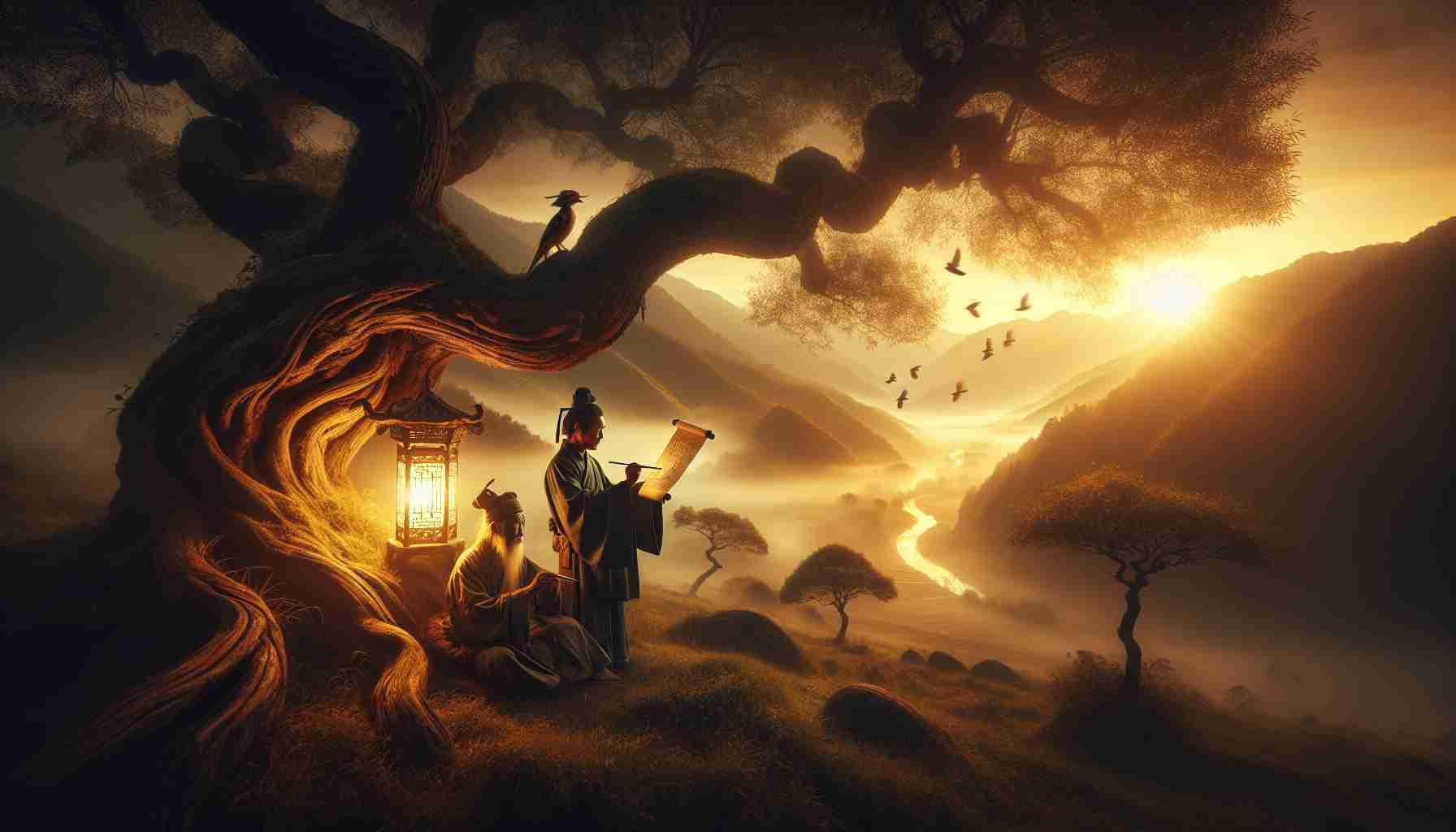

A long time ago, in ancient China, there lived a wise man named Laozi. He was not a king or a warrior. He didn’t build temples or lead armies. Instead, he wrote down the deepest truths of life in a small book called the Dao De Jing. People came from far away just to hear his quiet words. But Laozi didn’t like noise or crowds. He believed that the best lessons came from stillness and nature, not from chasing fame or power.
One day, Laozi packed a small bag and left the city. He wanted to find peace in the West, close to the mountains. As he walked a dusty road, he reached the border where a kind guard named Yin Xi stood. The guard had been waiting for Laozi, thinking he might never come.
“Wise master,” said Yin Xi as he bowed low. “I know who you are. Before you leave, please write down your wisdom, so the world will not lose it.”
Laozi looked at the sky. The birds flew free, and the wind danced between the trees. “The world does not need many words,” he said quietly. “But for you, I will write.”
So Laozi sat beneath a tree and wrote his thoughts. He wrote about the Tao, which means “The Way.” He explained that everything in life has a natural path, like a river that flows without trying. He wrote that Wu Wei, or “Effortless Action,” does not mean doing nothing. It means not forcing things. Just like a tree grows without effort, people can also live in peace when they stop pushing and start flowing with life.
Yin Xi watched Laozi write, amazed at how simple and true the words were. "How can no action be better than action?" he asked.
Laozi smiled. “Have you ever seen the rain fall?” he asked. “It does not argue or choose where to land. Yet it gives life to all. That is Wu Wei.”
Yin Xi nodded slowly. “So we must do less?”
“Not less,” Laozi said, “but let things be more natural. Act when it is time, rest when it is not. That is balance.”
By the end of the week, Laozi finished his short book, full of gentle truths. Then he stood, bowed to Yin Xi, and walked into the mountains, never to be seen again.
But he left behind the Dao De Jing, his tiny book with big wisdom. People kept reading it for hundreds of years, learning how to live simply, gently, and with peace in their hearts.
Laozi’s lesson was clear: Life doesn’t have to be a struggle. Sometimes, the quietest path is the strongest one. And the small things—the wind, the water, a kind word—carry great power when they follow the Way of the Tao.
And so, Laozi’s wisdom still lives on, reminding us that being at peace with the world begins with being at peace within.
A long time ago, in ancient China, there lived a wise man named Laozi. He was not a king or a warrior. He didn’t build temples or lead armies. Instead, he wrote down the deepest truths of life in a small book called the Dao De Jing. People came from far away just to hear his quiet words. But Laozi didn’t like noise or crowds. He believed that the best lessons came from stillness and nature, not from chasing fame or power.
One day, Laozi packed a small bag and left the city. He wanted to find peace in the West, close to the mountains. As he walked a dusty road, he reached the border where a kind guard named Yin Xi stood. The guard had been waiting for Laozi, thinking he might never come.
“Wise master,” said Yin Xi as he bowed low. “I know who you are. Before you leave, please write down your wisdom, so the world will not lose it.”
Laozi looked at the sky. The birds flew free, and the wind danced between the trees. “The world does not need many words,” he said quietly. “But for you, I will write.”
So Laozi sat beneath a tree and wrote his thoughts. He wrote about the Tao, which means “The Way.” He explained that everything in life has a natural path, like a river that flows without trying. He wrote that Wu Wei, or “Effortless Action,” does not mean doing nothing. It means not forcing things. Just like a tree grows without effort, people can also live in peace when they stop pushing and start flowing with life.
Yin Xi watched Laozi write, amazed at how simple and true the words were. "How can no action be better than action?" he asked.
Laozi smiled. “Have you ever seen the rain fall?” he asked. “It does not argue or choose where to land. Yet it gives life to all. That is Wu Wei.”
Yin Xi nodded slowly. “So we must do less?”
“Not less,” Laozi said, “but let things be more natural. Act when it is time, rest when it is not. That is balance.”
By the end of the week, Laozi finished his short book, full of gentle truths. Then he stood, bowed to Yin Xi, and walked into the mountains, never to be seen again.
But he left behind the Dao De Jing, his tiny book with big wisdom. People kept reading it for hundreds of years, learning how to live simply, gently, and with peace in their hearts.
Laozi’s lesson was clear: Life doesn’t have to be a struggle. Sometimes, the quietest path is the strongest one. And the small things—the wind, the water, a kind word—carry great power when they follow the Way of the Tao.
And so, Laozi’s wisdom still lives on, reminding us that being at peace with the world begins with being at peace within.